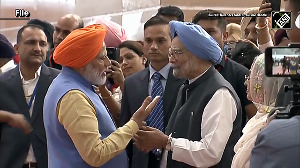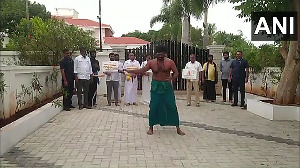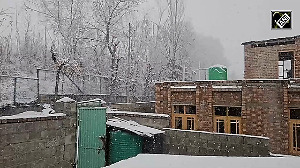Observing that open societies like India and Russia were facing the common threat of terrorism, Prime Minister Manmohan Singh Monday said the menace has to be fought in all its manifestations without loosing the values of democracy.
"Very openness of our societies makes us more vulnerable, and yet we must deal effectively with the threat without loosing the openness we so value and cherish," he said after being conferred the title of 'Professor Honoris Causa' by the Moscow State Univeristy.
He also said that the two countries should exploit the great potential for a strategic partnership in the knowledge based sectors and frontier fields like biotechnology, IT and nanotechnology.
"We must initiate an energy dialogue between experts and policy makers in our two countries to widen and deepen our cooperation in this field," he said adding, that space was another area where working together was a win-win proposition.
Noting that India and Russia were more threatened by the rise of terrorism, he said, "We know that those who resort to terror often float it in the garb of real or imaginary grievances. We categorically affirm that no cause justifies resort to terror."
Maintaining that democracy provided legitimate means to express dissent and engage in political activities, Dr Singh said, "Terrorism exploits the freedom our open societies provide to destroy our freedoms."
Stressing that Russia and India must work together to counter terrorism in all forms and manifestation, the prime minister said, "We cannot be selective. We must fight terrorism wherever it exists because terrorism anywhere threatens democracy everywhere."
"Russians who once recognised India for Raj Kapoor and the tunes of Awara should now discover new generation of Raj Kapoors and the new music of the modern generation.
"India today is a land of great creativity and enterprise. There is a need for new generation of Indians and Russians to rediscover each other," he said.
Noting that Indian scientists had opened new areas in biotechnology, IT and nanotechnology, he said these fields had proven to be revolutionary in their impact and there was great scope for expanded cooperation in these fields.
"We have agreed to set up a jointly funded Science and Technology Centre in Moscow to facilitate commercialisation of technologies for mutual benefit," he said.
Pointing out that New Delhi and Moscow were engaged in dealing with the challenges of globalisation, he said both countries face dual challenge of meeting the needs of their people at home while facing competition from the world outside. These included reserving and protecting the environment, fighting dieseases and pandemics, combating terrorism and preserving a democratic way of life.
"The evolving global system required better and more equitable management and needs more effective institutions to enable this," he said.
The prime minister was conferred honorary professorship of the Moscow State University for his contributions to economics and strengthening friendship between the two countries.
A medal and a diploma was presented to him by Academician Viktor Sadovnichy, rector of the university.
As part of the tradition of the university, the rector asked Dr Singh two questions, one whether he would uphold the ideals of peace and strengthen friendship and the other whether he would work towards flourishing of science and technology.
To both these questions Dr Singh replied in the affirmative.
The Moscow State University is the oldest university in the country and is named after distinguished Russian scholar and scientist Mikhail Lomonosov.






 © 2024 Rediff.com -
© 2024 Rediff.com -